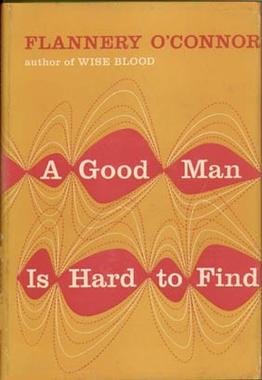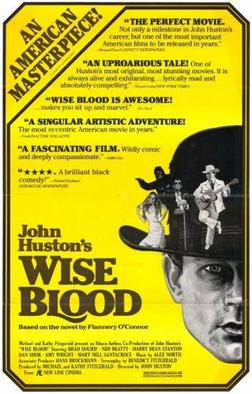Related Research Articles

Mary Flannery O'Connor was an American novelist, short story writer and essayist. She wrote two novels and 31 short stories, as well as a number of reviews and commentaries.

Wise Blood is the first novel by American author Flannery O'Connor, published in 1952. The novel was assembled from disparate stories first published in Mademoiselle, Sewanee Review and Partisan Review. The first chapter is an expanded version of her Master's thesis, "The Train", and other chapters are reworked versions of "The Peeler," "The Heart of the Park" and "Enoch and the Gorilla". The novel concerns a returning World War II veteran who, haunted by a life-long crisis of faith, resolves to form an anti-religious ministry in an eccentric, fictionalized Southern city after finding his family homestead abandoned without a trace.
The Violent Bear It Away is a 1960 novel by American author Flannery O'Connor. It is the second and final novel that she published. The first chapter was originally published as the story "You Can't Be Any Poorer Than Dead" in the journal New World Writing. The novel tells the story of Francis Marion Tarwater, a fourteen-year-old boy who is trying to escape the destiny his uncle has prescribed for him: the life of a prophet. Like most of O'Connor's stories, the novel is filled with Catholic themes and dark images, making it a classic example of Southern Gothic literature.

A Good Man Is Hard to Find and Other Stories is a collection of short stories by American author Flannery O'Connor. The collection was first published in 1955. The subjects of the short stories range from baptism to serial killers to human greed and exploitation. The majority of the stories include jarring violent scenes that make the characters undergo a spiritual change. The short stories commonly have tones of Catholicism related to life and death scenarios. For instance, in the story "A Good Man Is Hard To Find" the villain states, "She would have been a good woman if it had been somebody there to shoot her every minute of her life."

Wise Blood is a 1979 black-comedy drama film directed by John Huston and starring Brad Dourif, Dan Shor, Amy Wright, Harry Dean Stanton, and Ned Beatty. It is based on the 1952 novel Wise Blood by Flannery O'Connor. As a co-production with Germany the film was titled Der Ketzer or Die Weisheit des Blutes when released in Germany, and Le Malin when released in France.
Everything That Rises Must Converge is a collection of short stories written by Flannery O'Connor during the final decade of her life. The collection's eponymous story derives its name from the work of Pierre Teilhard de Chardin. The collection was published posthumously in 1965 and contains an introduction by Robert Fitzgerald. Of the volume's nine stories, seven had been printed in magazines or literary journals prior to being collected, including three that won O. Henry Awards: "Greenleaf" (1957), "Everything That Rises Must Converge" (1963), and "Revelation" (1965). "Judgment Day" is a dramatically reworked version of "The Geranium", which was one of O'Connor's earliest publications and appeared in her graduate thesis at the University of Iowa. "Parker's Back", the collection's only completely new story, was a last-minute addition.

"Revelation" is a Southern Gothic short story by author Flannery O'Connor about the delivery and effect of a revelation to a sinfully proud, self-righteous, middle-aged, middle class, rural, white Southern woman that her confidence in her own Christian salvation is an error. The protagonist receives divine grace by accepting God's judgment that she is unfit for salvation, by learning that the prospect for her eventual redemption improves after she receives a vision of Particular Judgment, where she observes the souls of people she detests are the first to ascend to Heaven and those of people like herself who "always had a little of everything and the God-given wit to use it right" are last to ascend and experience purgation by fire on the way up.

"A Good Man Is Hard to Find" is a Southern gothic short story first published in 1953 by author Flannery O'Connor who, in her own words, described it as "the story of a family of six which, on its way driving to Florida [from Georgia], is slaughtered by an escaped convict who calls himself the Misfit".
A peeler is a metal blade attached to a handle that is used for peeling vegetables.
The bibliography of Flannery O'Connor includes two novels, more than thirty short stories, and several collections.
"Wildcat" is an early short story by the American author Flannery O'Connor. It is one of the six stories included in O'Connor's 1947 master's thesis The Geranium: A Collection of Short Stories and was published posthumously in The North American Review in 1970. It later appeared in the 1971 collection The Complete Stories.
"The Train" is an early short story by the American author Flannery O'Connor. It is one of the six stories included in O'Connor's 1947 master's thesis The Geranium: A Collection of Short Stories and was published in The Sewanee Review in 1948. It later appeared in the 1971 collection The Complete Stories. O'Connor revised this story into the first chapter of her novel, Wise Blood.

The Complete Stories is a collection of short stories by Flannery O'Connor. It was published in 1971 by Farrar, Straus and Giroux. It comprises all the stories in A Good Man Is Hard to Find and Everything That Rises Must Converge plus several previously unavailable stories.
"The River" is a Southern gothic short story by the American author Flannery O'Connor that was first published in 1953 about a very young boy who is taken by his babysitter to a preacher at a Christian healing where he is baptized in a river, and, the next day, runs away from home to the site of his baptism and baptizes himself, and then is taken by the river to find the Kingdom of Christ, as told by the preacher, and drowns.
"A Stroke of Good Fortune", originally published as "A Woman on the Stairs", is a short story by the American author Flannery O'Connor about a woman who discovers to her disappointment and disbelief that she is pregnant.
"Judgement Day" is a short story by Flannery O'Connor. It was published in 1965 in her short story collection Everything That Rises Must Converge. O'Connor finished the collection during her final battle with lupus. She died in 1964, just before her final book was published. A devout Roman Catholic, O'Connor often used religious themes in her work. "Judgement Day" contains many similarities to one of O'Connor's earliest short stories, "The Geranium."
"All my stories are about the action of grace on a character who is not very willing to support it, but most people think of these stories as hard, hopeless and brutal."—Flannery O'Connor
"The Artificial Nigger" is a short story by Flannery O'Connor. It was published in 1955 in her short story collection A Good Man Is Hard to Find. The title refers to statues popular in the Jim Crow-era Southern United States, depicting grotesque minstrelsy characters. Like most of her other works, the story reflects O'Connor's Roman Catholic beliefs and acts as a parable.
"A Late Encounter with the Enemy" is a short story by Flannery O'Connor. It was written in 1953 and published in the September 1953 issue of Harper’s Bazaar, appearing later in her short story collection A Good Man Is Hard to Find (1955). It is her only story dealing with the American Civil War. A devout Roman Catholic, O'Connor often used religious themes in her work.
"A Temple of the Holy Ghost" is a short story by Flannery O'Connor. It was written in 1953 and published in 1955 in her short story collection A Good Man Is Hard to Find and is one of O'Connor's few explicitly Catholic stories. A devout Roman Catholic, O'Connor often used religious themes in her work, but more commonly described rural Southern Protestants as her main characters.
The Heart of the Park is a short story written by Flannery O'Connor.
References
- ↑ Connie Ann Kirk, Critical companion to Flannery O'Connor (Infobase Publishing, 2008)